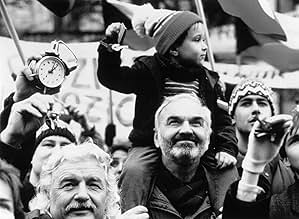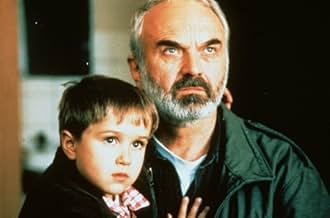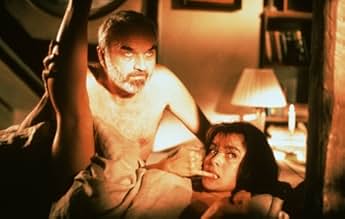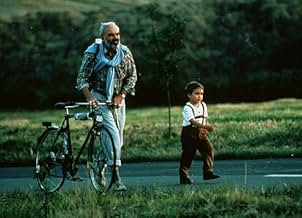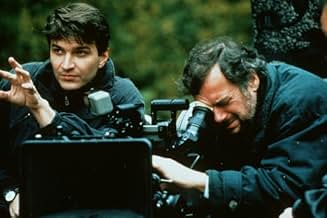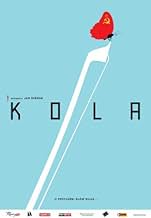NOTE IMDb
7,7/10
16 k
MA NOTE
Un célibataire endurci a la surprise de sa vie lorsqu'un plan d'enrichissement rapide se retourne contre lui et le laisse avec un nouveau colocataire de la taille d'un pingouin.Un célibataire endurci a la surprise de sa vie lorsqu'un plan d'enrichissement rapide se retourne contre lui et le laisse avec un nouveau colocataire de la taille d'un pingouin.Un célibataire endurci a la surprise de sa vie lorsqu'un plan d'enrichissement rapide se retourne contre lui et le laisse avec un nouveau colocataire de la taille d'un pingouin.
- Récompensé par 1 Oscar
- 21 victoires et 14 nominations au total
Zdenek Sverák
- Louka
- (as Zdeněk Svěrák)
Andrey Khalimon
- Kolja
- (as Andrej Chalimon)
Irina Bezrukova
- Nadezda
- (as Irina Livanova)
Liliyan Malkina
- Tamara
- (as Lilian Malkina)
Nela Boudová
- Brozová
- (as Nella Boudová)
Histoire
Le saviez-vous
- AnecdotesThe child actor who plays Kolja, Andrey Khalimon, was not cast until three weeks before filming started.
- GaffesThroughout the movie, many background cars are clearly newer than 1989 models. The film is set in 1989.
- ConnexionsFeatured in 54th Golden Globe Awards (1997)
Commentaire à la une
This is a variation on the theme of an older man whose emotional life is reawakened by his being thrust into unexpected parenting of a young child. Many have complained of the exploitation of such time-worn subject matter, but the worth of "Kolya" lies in the particulars of how its themes are developed. After all there are still good movies made about underdog sports teams prevailing, and even the exact same material (thinking Shakespeare here) can be made fresh through different productions.
The man in question here is Frantisek Louka, the place is the Czech Republic, and the time is 1988 (just prior to the "Velvet Revolution"). Financial constraints tempt Louka to enter into a bargain to marry a Russian woman so she can get Czech citizenship and, it turns out, escape to West Germany to be with her lover. This leaves Louka to care for the child "Kolya." One thing that makes this movie stand out is the quality of the acting by all involved. In particular Andrei Chalimon as the Russian child is very natural and will win your heart as he does Louka's. But it's a slow process.
Another thing that sets this off is the political backdrop. I knew about Russia's occupation of the Czech Republic after World War II and the non-violent overthrow of the Communist government in 1989, but that is about as far as my knowledge went. This movie portrays what it was like to live in that environment in a concrete way that a history book cannot. A lot of little scenes exemplify the underlying tensions, such as Louka's being expected to display both the Czech and Russian flags in his window, Louka's mother refusing to let some Russian soldiers in to wash their hands by lying about her having no water, and Louka's purposeful refusal to learn the Russian language. So, this movie provided a small increment in my knowledge of Czech history and that's better than nothing. How the political situation drives the action makes for a singularly interesting story.
The musical score that contains works by the Czech composers Dvořák, Suk, Fibich, and Smetana adds a special quality.
Don't be turned away from seeing this because it touches on familiar themes; it is a quality film with unique characteristics.
The man in question here is Frantisek Louka, the place is the Czech Republic, and the time is 1988 (just prior to the "Velvet Revolution"). Financial constraints tempt Louka to enter into a bargain to marry a Russian woman so she can get Czech citizenship and, it turns out, escape to West Germany to be with her lover. This leaves Louka to care for the child "Kolya." One thing that makes this movie stand out is the quality of the acting by all involved. In particular Andrei Chalimon as the Russian child is very natural and will win your heart as he does Louka's. But it's a slow process.
Another thing that sets this off is the political backdrop. I knew about Russia's occupation of the Czech Republic after World War II and the non-violent overthrow of the Communist government in 1989, but that is about as far as my knowledge went. This movie portrays what it was like to live in that environment in a concrete way that a history book cannot. A lot of little scenes exemplify the underlying tensions, such as Louka's being expected to display both the Czech and Russian flags in his window, Louka's mother refusing to let some Russian soldiers in to wash their hands by lying about her having no water, and Louka's purposeful refusal to learn the Russian language. So, this movie provided a small increment in my knowledge of Czech history and that's better than nothing. How the political situation drives the action makes for a singularly interesting story.
The musical score that contains works by the Czech composers Dvořák, Suk, Fibich, and Smetana adds a special quality.
Don't be turned away from seeing this because it touches on familiar themes; it is a quality film with unique characteristics.
Meilleurs choix
Connectez-vous pour évaluer et suivre la liste de favoris afin de recevoir des recommandations personnalisées
- How long is Kolya?Alimenté par Alexa
Détails
- Date de sortie
- Pays d’origine
- Site officiel
- Langues
- Aussi connu sous le nom de
- Коля
- Lieux de tournage
- Sociétés de production
- Voir plus de crédits d'entreprise sur IMDbPro
Box-office
- Montant brut aux États-Unis et au Canada
- 5 770 254 $US
- Montant brut mondial
- 5 770 254 $US
- Durée1 heure 51 minutes
- Couleur
- Mixage
- Rapport de forme
- 1.66 : 1
Contribuer à cette page
Suggérer une modification ou ajouter du contenu manquant



